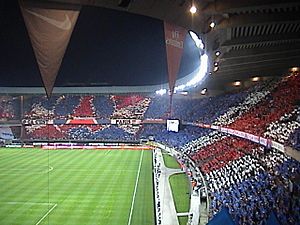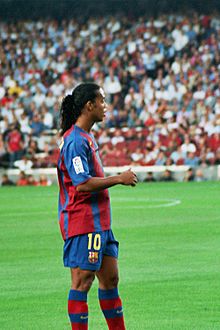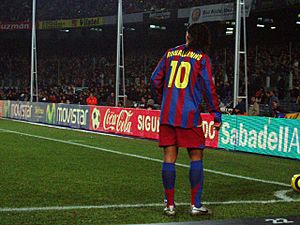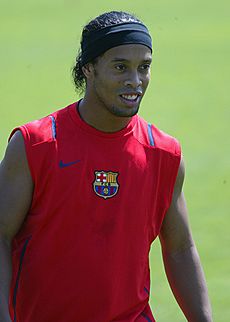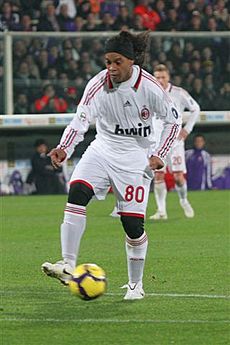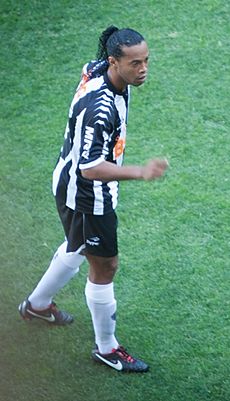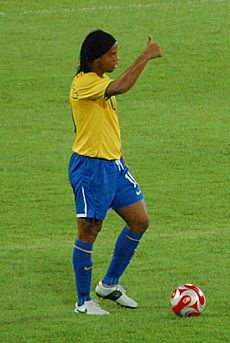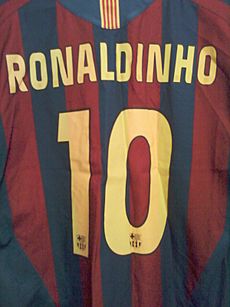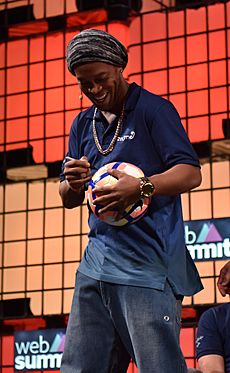Ronaldinho facts for kids
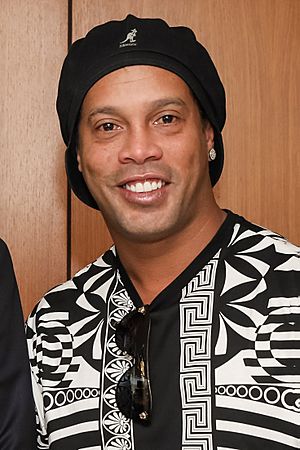
Ronaldinho in 2019
|
|||||||||||||||||||||||||||||||||||||||||||||||||||||||||||||
| Personal information | |||||||||||||||||||||||||||||||||||||||||||||||||||||||||||||
|---|---|---|---|---|---|---|---|---|---|---|---|---|---|---|---|---|---|---|---|---|---|---|---|---|---|---|---|---|---|---|---|---|---|---|---|---|---|---|---|---|---|---|---|---|---|---|---|---|---|---|---|---|---|---|---|---|---|---|---|---|---|
| Full name | Ronaldo de Assis Moreira | ||||||||||||||||||||||||||||||||||||||||||||||||||||||||||||
| Date of birth | 21 March 1980 | ||||||||||||||||||||||||||||||||||||||||||||||||||||||||||||
| Place of birth | Porto Alegre, Brazil | ||||||||||||||||||||||||||||||||||||||||||||||||||||||||||||
| Height | 1.82 m (6 ft 0 in) | ||||||||||||||||||||||||||||||||||||||||||||||||||||||||||||
| Position(s) | Attacking midfielder, left winger | ||||||||||||||||||||||||||||||||||||||||||||||||||||||||||||
| Youth career | |||||||||||||||||||||||||||||||||||||||||||||||||||||||||||||
| 1987–1998 | Grêmio | ||||||||||||||||||||||||||||||||||||||||||||||||||||||||||||
| Senior career* | |||||||||||||||||||||||||||||||||||||||||||||||||||||||||||||
| Years | Team | Apps | (Gls) | ||||||||||||||||||||||||||||||||||||||||||||||||||||||||||
| 1998–2001 | Grêmio | 89 | (47) | ||||||||||||||||||||||||||||||||||||||||||||||||||||||||||
| 2001–2003 | Paris Saint-Germain | 55 | (17) | ||||||||||||||||||||||||||||||||||||||||||||||||||||||||||
| 2003–2008 | Barcelona | 145 | (70) | ||||||||||||||||||||||||||||||||||||||||||||||||||||||||||
| 2008–2011 | AC Milan | 76 | (20) | ||||||||||||||||||||||||||||||||||||||||||||||||||||||||||
| 2011–2012 | Flamengo | 56 | (23) | ||||||||||||||||||||||||||||||||||||||||||||||||||||||||||
| 2012–2014 | Atlético Mineiro | 58 | (20) | ||||||||||||||||||||||||||||||||||||||||||||||||||||||||||
| 2014–2015 | Querétaro | 25 | (8) | ||||||||||||||||||||||||||||||||||||||||||||||||||||||||||
| 2015 | Fluminense | 7 | (0) | ||||||||||||||||||||||||||||||||||||||||||||||||||||||||||
| Total | 511 | (205) | |||||||||||||||||||||||||||||||||||||||||||||||||||||||||||
| International career | |||||||||||||||||||||||||||||||||||||||||||||||||||||||||||||
| 1997 | Brazil U17 | 13 | (3) | ||||||||||||||||||||||||||||||||||||||||||||||||||||||||||
| 1998–1999 | Brazil U20 | 17 | (8) | ||||||||||||||||||||||||||||||||||||||||||||||||||||||||||
| 1999–2000 | Brazil U23 | 19 | (15) | ||||||||||||||||||||||||||||||||||||||||||||||||||||||||||
| 2008 | Brazil Olympic (O.P.) | 8 | (3) | ||||||||||||||||||||||||||||||||||||||||||||||||||||||||||
| 1999–2013 | Brazil | 97 | (33) | ||||||||||||||||||||||||||||||||||||||||||||||||||||||||||
|
Medal record
|
|||||||||||||||||||||||||||||||||||||||||||||||||||||||||||||
|
|||||||||||||||||||||||||||||||||||||||||||||||||||||||||||||
| *Club domestic league appearances and goals | |||||||||||||||||||||||||||||||||||||||||||||||||||||||||||||
Ronaldo de Assis Moreira (born 21 March 1980), known as Ronaldinho Gaúcho or simply Ronaldinho, is a Brazilian former professional footballer. He played as an attacking midfielder or left winger. Many consider him one of the greatest players of all time.
Ronaldinho won two FIFA World Player of the Year awards and a Ballon d'Or. He is the only player to have won a World Cup, a Copa América, a Confederations Cup, a Champions League, a Copa Libertadores, and a Ballon d'Or. Known for his amazing dribbling, accurate free-kicks, and clever tricks, he was called "O Bruxo" ('The Wizard').
He started his career at Grêmio in 1998. At age 20, he moved to Paris Saint-Germain in France. In 2003, he joined Barcelona, where he had his best years. He helped Barcelona win their second UEFA Champions League and two La Liga titles. Ronaldinho received the 2005 Ballon d'Or and his second FIFA World Player of the Year award.
After his time at Barcelona, Ronaldinho played for AC Milan in Italy, winning the 2010–11 Serie A. He then returned to Brazil, playing for Flamengo and Atlético Mineiro, where he won the 2013 Copa Libertadores. Later, he played for Querétaro in Mexico and Fluminense in Brazil. Ronaldinho retired from football in 2018.
Contents
Early Life and Football Beginnings
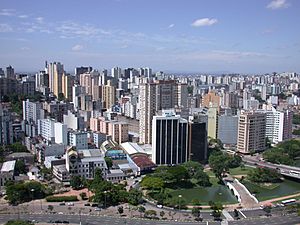
Ronaldo de Assis Moreira was born on 21 March 1980 in Porto Alegre, Brazil. His mother was a salesperson and nurse. His father was a shipyard worker and a local footballer. When Ronaldinho was eight, his father passed away in a swimming pool accident. His older brother, Roberto, became his manager, and his sister, Deisi, handled his press.
Ronaldinho's football skills shone early, earning him the nickname Ronaldinho ('small Ronaldo'). This was because he was often the youngest and smallest player. He loved futsal and beach football, which helped him develop his amazing ball control. At 13, he famously scored all 23 goals in a 23–0 match. He became a rising star at the 1997 FIFA U-17 World Championship in Egypt.
Growing up, Ronaldinho admired football legends like Rivelino, Diego Maradona, Romário, and future teammates Ronaldo and Rivaldo.
Club Career Highlights
Starting at Grêmio
Ronaldinho began his journey in the Grêmio youth team. He made his first team debut in 1998. In 1999, at 18, he scored 22 goals in 47 matches. He impressed fans with his skills, especially in games against rival team Internacional. Ronaldinho helped Grêmio win the Copa Sul and the Campeonato Gaúcho.
In 2001, he almost moved to Arsenal in England. However, the transfer did not happen due to issues with his travel documents.
Moving to Paris Saint-Germain
In 2001, Ronaldinho signed a five-year contract with French club Paris Saint-Germain. He quickly showed his talent, scoring his first goal in October 2001. He continued to score impressive goals, including a double against Troyes.
During his time in Paris, Ronaldinho sometimes struggled with staying focused on his training schedule. Despite this, he had many memorable moments. In 2002, he scored two goals against rivals Marseille, including a fantastic free kick. He also scored a "goal of the season" against Guingamp with incredible dribbling. Ronaldinho helped PSG reach the Coupe de France final in 2003, but they lost. After two seasons, he wanted to leave the club.
Becoming a Star at Barcelona
In 2003, Ronaldinho joined Barcelona in a €30 million deal. This move marked the start of his most famous years. He made his debut in July 2003 and scored his first goal in September. Despite an injury early on, he helped Barcelona finish second in the league in his first season. His pass led to a winning goal against Real Madrid in 2004, which many saw as the start of Barcelona's rise.
Winning Titles and Awards
Ronaldinho won his first league title with Barcelona in 2004–05. He was named FIFA World Player of the Year in December 2004. His captain, Carles Puyol, said Ronaldinho brought spirit back to the team. In March 2005, he scored two amazing goals against Chelsea in the UEFA Champions League.
In 2005, Ronaldinho received many personal awards. He won the first FIFPro World Player of the Year and the Ballon d'Or. He also won his second consecutive FIFA World Player of the Year award. On 19 November, he scored twice against Real Madrid, earning a rare standing ovation from the opposing fans.
The 2005–06 season was one of Ronaldinho's best. He was key to Barcelona winning their first Champions League title in 14 years. He scored important goals against Chelsea and Benfica. Barcelona also won their second-straight La Liga title, giving Ronaldinho his first career "double" (winning two major trophies in one season). He finished the season with a career-high 26 goals.
Later Years at Barcelona
In the 2006–07 season, Ronaldinho scored his 50th league goal with a spectacular overhead bicycle kick. He helped Barcelona in the Club World Cup, where they finished second. Despite scoring 21 league goals, Barcelona lost the title to Real Madrid.
The 2007–08 season was affected by injuries. Ronaldinho faced challenges in maintaining his top form and dedication to training. In May 2008, Barcelona's president said Ronaldinho needed a "new challenge." He played his last match for Barcelona in an anti-racism exhibition game.
Time with AC Milan
In July 2008, Ronaldinho joined Italian club AC Milan. He chose the number 80 jersey, representing his birth year. He scored his first goal for Milan in a derby against Inter Milan in September. He finished his first season with 10 goals.
His second season at Milan saw him regain his form. He scored two goals against Juventus and his first hat-trick for Milan against Siena. Ronaldinho ended the season as the top assist provider in Serie A. In his final season, he played alongside new signings Zlatan Ibrahimović and Robinho.
Return to Brazil and Mexico
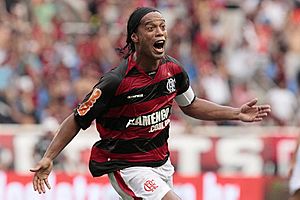
In January 2011, Ronaldinho returned to Brazil to play for Flamengo. He was welcomed by over 20,000 fans. He won his first trophy with Flamengo, the Taça Guanabara, in February 2011. He later helped the team win the Campeonato Carioca. In May 2012, he left Flamengo due to disagreements over his contract.
Ronaldinho then joined Atlético Mineiro in June 2012. He wore number 49 as a tribute to his mother's birth year. He led Atlético Mineiro to a strong 2012 season, finishing second in the league. The next year, he helped the club win its first Copa Libertadores title. His performances earned him the 2013 South American Footballer of the Year award.
In December 2013, Atlético Mineiro played in the 2013 FIFA Club World Cup. Ronaldinho scored a free-kick in the semi-final. He left Atlético Mineiro in July 2014 after winning the 2014 Recopa Sudamericana.
He then signed with Mexican club Querétaro in September 2014. He scored twice against Club América in April 2015, receiving a standing ovation from the opposing fans. Querétaro reached the Liga MX playoffs final but lost. Ronaldinho left the club in June 2015.
In July 2015, Ronaldinho returned to Brazil to play for Fluminense. However, he left the club by mutual agreement in September, after making nine appearances.
International Career for Brazil
Youth and Early Senior Success
In 1997, Ronaldinho was part of the first Brazilian team to win the 1997 FIFA U-17 World Championship. He scored two goals and earned the Bronze Ball award. In 1999, he played in the South American Youth Championship and the FIFA World Youth Championship.
Ronaldinho made his debut for the Brazilian senior team in June 1999. He scored one goal during Brazil's winning 1999 Copa América campaign. Soon after, he played in the 1999 FIFA Confederations Cup, scoring in almost every match, including a hat-trick against Saudi Arabia. He won the Golden Ball for best player and Golden Boot for top scorer in that tournament. In 2000, he helped Brazil win the CONMEBOL Pre-Olympic Tournament.
2002 World Cup Victory
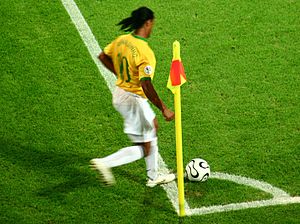
Ronaldinho played in his first World Cup in 2002. He was part of a powerful attacking trio with Ronaldo and Rivaldo, known as the "Three Rs." He appeared in five matches, scoring two goals and providing three assists. His first goal was against China PR.
His most famous World Cup moment came in the quarter-final against England. With Brazil behind, Ronaldinho set up Rivaldo for the equalizer. Then, he scored a spectacular free-kick from 40 yards, surprising England's goalkeeper David Seaman. Brazil won 2–1. Ronaldinho was suspended for the semi-final but returned for the final. Brazil won its record fifth World Cup title by defeating Germany 2–0.
Confederations Cup and Olympics
Ronaldinho captained Brazil to their second Confederations Cup title in 2005. He scored a penalty in the semi-final against Germany. He was named Man of the Match in the 4–1 final victory over Argentina. Ronaldinho is one of the tournament's all-time top goalscorers with nine goals.
At the 2006 World Cup, Ronaldinho was part of Brazil's "magic quartet" of attackers. However, the team had a disappointing campaign, losing to France in the quarter-finals. Ronaldinho did not score in the tournament. After Brazil's elimination, a statue of Ronaldinho was damaged by disappointed fans.
In 2008, Ronaldinho captained the Brazil Olympic team at the 2008 Summer Olympics in Beijing. He scored two goals against New Zealand. Brazil won the bronze medal after defeating Belgium.
Ronaldinho was not selected for the 2010 or 2014 World Cup squads. He made a return to the national team in 2011 and captained the team in a friendly against Chile in 2013.
Ronaldinho's Unique Playing Style
Ronaldinho, known as "O Bruxo" ('The Wizard'), is famous for his incredible skills. He could play in many attacking roles, often as a winger or a classic number 10 attacking midfielder. He was naturally right-footed but could shoot well with both feet.
He was a master of free-kicks and penalty kicks. He could bend the ball or strike it with power. Many consider him one of the best free-kick takers ever, even influencing Lionel Messi.
Pundits praised Ronaldinho for his technical skills, flair, and creativity. He had exceptional ball control, pace, and dribbling ability. He used many tricks and feints to get past opponents, like step overs and nutmegs. He also performed flashy moves like back-heels and no-look passes. One of his signature moves is the "elastico," which he learned from watching his idol, Rivelino. In some parts of Africa, this move is even called 'The Gaúcho' because of him.
Life Beyond Football
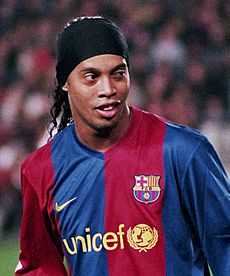
Ronaldinho has worked with many big companies like Nike, Pepsi, Coca-Cola, and EA Sports. He was one of the highest-paid players due to his endorsements. He appeared on the cover of several FIFA video games.
His 2005 Nike advertisement, where he juggled a football and hit the crossbar repeatedly without the ball touching the ground, became one of the first viral videos on YouTube. He also appeared in other famous Nike commercials.
Ronaldinho has been a UNICEF ambassador since 2006. In 2011, he helped the Joint United Nations Programme on HIV/AIDS raise awareness among young people. He is very popular on social media, with millions of followers. In 2017, Barcelona announced he would be an ambassador for the club.
In 2018, Ronaldinho's brother announced his retirement from professional football. He appeared at the closing ceremony of the 2018 FIFA World Cup in Moscow, performing on an African drum.
Post-Retirement Activities
In January 2019, Ronaldinho played in a testimonial beach soccer match in Brazil. He scored a hat-trick for Brazil against Japan. He also played futsal in India for the Goa 5′s and Delhi Dragons teams.
Ronaldinho has also appeared in a martial arts film called Kickboxer: Retaliation. There is also a Brazilian comic strip called Ronaldinho Gaúcho, which features a fictionalized version of him as a child. This comic strip was adapted into an animated TV series.
Personal Life
Ronaldinho has a son named João, born in 2005. He gained Spanish citizenship in 2007.
Career Statistics
Ronaldinho made 853 appearances and scored 328 goals for club and country combined.
Club
| Club | Season | League | Regional league | Cup | Continental | Other | Total | |||||||
|---|---|---|---|---|---|---|---|---|---|---|---|---|---|---|
| Division | Apps | Goals | Apps | Goals | Apps | Goals | Apps | Goals | Apps | Goals | Apps | Goals | ||
| Grêmio | 1998 | Brasileirão | 14 | 1 | 7 | 2 | 2 | 0 | 15 | 3 | — | 38 | 6 | |
| 1999 | Brasileirão | 17 | 4 | 17 | 15 | 3 | 0 | 4 | 2 | 6 | 1 | 47 | 22 | |
| 2000 | Brasileirão | 21 | 14 | 13 | 11 | 3 | 3 | — | — | 37 | 28 | |||
| 2001 | Brasileirão | — | — | — | — | 3 | 2 | 3 | 2 | |||||
| Total | 52 | 19 | 37 | 28 | 8 | 3 | 19 | 5 | 9 | 3 | 125 | 58 | ||
| Paris Saint-Germain | 2001–02 | Ligue 1 | 28 | 9 | — | 6 | 2 | 6 | 2 | — | 40 | 13 | ||
| 2002–03 | Ligue 1 | 27 | 8 | — | 6 | 3 | 4 | 1 | — | 37 | 12 | |||
| Total | 55 | 17 | — | 12 | 5 | 10 | 3 | — | 77 | 25 | ||||
| Barcelona | 2003–04 | La Liga | 32 | 15 | — | 6 | 3 | 7 | 4 | — | 45 | 22 | ||
| 2004–05 | La Liga | 35 | 9 | — | — | 7 | 4 | — | 42 | 13 | ||||
| 2005–06 | La Liga | 29 | 17 | — | 2 | 1 | 12 | 7 | 2 | 1 | 45 | 26 | ||
| 2006–07 | La Liga | 32 | 21 | — | 4 | 0 | 8 | 2 | 5 | 1 | 49 | 24 | ||
| 2007–08 | La Liga | 17 | 8 | — | 1 | 0 | 8 | 1 | — | 26 | 9 | |||
| Total | 145 | 70 | — | 13 | 4 | 42 | 18 | 7 | 2 | 207 | 94 | |||
| AC Milan | 2008–09 | Serie A | 29 | 8 | — | 1 | 0 | 6 | 2 | — | 36 | 10 | ||
| 2009–10 | Serie A | 36 | 12 | — | — | 7 | 3 | — | 43 | 15 | ||||
| 2010–11 | Serie A | 11 | 0 | — | — | 5 | 1 | — | 16 | 1 | ||||
| Total | 76 | 20 | — | 1 | 0 | 18 | 6 | — | 95 | 26 | ||||
| Flamengo | 2011 | Brasileirão | 31 | 14 | 13 | 4 | 5 | 1 | 3 | 2 | — | 52 | 21 | |
| 2012 | Brasileirão | 2 | 1 | 10 | 4 | — | 8 | 2 | — | 20 | 7 | |||
| Total | 33 | 15 | 23 | 8 | 5 | 1 | 11 | 4 | — | 72 | 28 | |||
| Atlético Mineiro | 2012 | Brasileirão | 32 | 9 | — | — | — | — | 32 | 9 | ||||
| 2013 | Brasileirão | 14 | 7 | 6 | 4 | 2 | 0 | 14 | 4 | 2 | 2 | 38 | 17 | |
| 2014 | Brasileirão | 2 | 0 | 4 | 0 | — | 7 | 1 | 2 | 0 | 15 | 1 | ||
| Total | 48 | 16 | 10 | 4 | 2 | 0 | 21 | 5 | 4 | 2 | 85 | 27 | ||
| Querétaro | 2014–15 | Liga MX | 25 | 8 | —!!4 | 0 | — | — | 29 | 8 | ||||
| Fluminense | 2015 | Brasileirão | 7 | 0 | —!!2 | 0 | — | — | 9 | 0 | ||||
| Career total | 441 | 165 | 70 | 40 | 47 | 13 | 121 | 41 | 20 | 7 | 699 | 266 | ||
International
| Team | Year | Competitive | Friendly | Total | |||
|---|---|---|---|---|---|---|---|
| Apps | Goals | Apps | Goals | Apps | Goals | ||
| Brazil U17 | 1997 | 13 | 3 | – | 13 | 3 | |
| Brazil U20 | 1998 | – | 3 | 2 | 3 | 2 | |
| 1999 | 14 | 6 | – | 14 | 6 | ||
| Total | 14 | 6 | 3 | 2 | 17 | 8 | |
| Brazil U23 | 1999 | – | 4 | 1 | 4 | 1 | |
| 2000 | 11 | 10 | 4 | 4 | 15 | 14 | |
| 2008 | 6 | 2 | 2 | 1 | 8 | 3 | |
| Total | 17 | 12 | 10 | 6 | 27 | 18 | |
| Brazil | 1999 | 9 | 7 | 4 | 0 | 13 | 7 |
| 2000 | 4 | 0 | 1 | 1 | 5 | 1 | |
| 2001 | 2 | 0 | 2 | 1 | 4 | 1 | |
| 2002 | 5 | 2 | 5 | 2 | 10 | 4 | |
| 2003 | 4 | 1 | 4 | 1 | 8 | 2 | |
| 2004 | 5 | 1 | 5 | 5 | 10 | 6 | |
| 2005 | 10 | 5 | 2 | 1 | 12 | 6 | |
| 2006 | 5 | 0 | 4 | 0 | 9 | 0 | |
| 2007 | 4 | 1 | 7 | 4 | 11 | 5 | |
| 2008 | 2 | 0 | – | 2 | 0 | ||
| 2009 | 2 | 0 | 1 | 0 | 3 | 0 | |
| 2010 | – | 1 | 0 | 1 | 0 | ||
| 2011 | – | 5 | 1 | 5 | 1 | ||
| 2012 | – | 1 | 0 | 1 | 0 | ||
| 2013 | – | 3 | 0 | 3 | 0 | ||
| Total | 52 | 17 | 45 | 16 | 97 | 33 | |
| Career total | 96 | 38 | 58 | 24 | 154 | 62 | |
Honours and Achievements
Grêmio
- Copa Sul: 1999
- Campeonato Gaúcho: 1999
Barcelona
- La Liga: 2004–05, 2005–06
- Supercopa de España: 2005, 2006
- UEFA Champions League: 2005–06
Flamengo
- Campeonato Carioca: 2011
Atlético Mineiro
- Campeonato Mineiro: 2013
- Copa Libertadores: 2013
- Recopa Sudamericana: 2014
Brazil U17
- South American U-17 Championship: 1997
- FIFA U-17 World Championship: 1997
Brazil U23
- CONMEBOL Pre-Olympic Tournament: 2000
- Olympic Bronze Medal: 2008
Brazil
- Copa América: 1999
- FIFA World Cup: 2002
- FIFA Confederations Cup: 2005, runner-up 1999
Individual Awards
- Campeonato Gaucho top scorer: 1999
- FIFA Confederations Cup Golden Ball: 1999
- FIFA Confederations Cup Golden Shoe: 1999
- South American Team of the Year: 1999
- CONMEBOL Pre-Olympic Tournament top scorer: 2000
- Bola de Prata: 2000, 2011, 2012
- FIFA World Cup All-Star Team: 2002
- Ligue 1 Goal of The Year: 2003
- FIFA 100: 2004
- Don Balón Award: 2003–04, 2005–06
- Trofeo EFE: 2003–04
- FIFA World Player of the Year: 2004, 2005
- UEFA Team of the Year: 2004, 2005, 2006
- World Soccer Magazine World Player of The Year: 2004, 2005
- UEFA Club Forward of the Year: 2004–05
- FIFA Confederations Cup Bronze Ball: 2005
- Ballon d'Or: 2005
- Onze d'Or: 2005
- FIFPro World Player of the Year: 2005, 2006
- FIFPro World XI: 2005, 2006, 2007
- UEFA Club Footballer of the Year: 2005–06
- La Liga top assist provider: 2005–06
- UEFA Champions League top assist provider: 2005–06
- FIFA Club World Cup Bronze Ball: 2006
- FIFA World Player of the Year Bronze award: 2006
- Golden Foot: 2009
- Sports Illustrated Team of the Decade: 2009
- World Player of the Decade 2000s: 2009
- Serie A top assist provider: 2009–10
- Campeonato Brasileiro Série A Team of the Year: 2011, 2012
- Campeonato Brasileiro Série A Best Fan's Player: 2012
- Campeonato Brasileiro Série A top assist provider: 2012
- Bola de Ouro: 2012
- Copa Libertadores top assist provider: 2012, 2013
- FIFA Club World Cup top scorer: 2013
- South American Footballer of the Year: 2013
- UEFA Ultimate Team of the Year (substitute; published in 2015)
- Brazilian Football Museum Hall of Fame
- AC Milan Hall of Fame
- Ballon d'Or Dream Team (Silver): 2020
- Globe Soccer Awards Player Career Award: 2021
Other Recognitions In 2012, two Brazilian scientists named a new species of bee, Eulaema quadragintanovem, after Ronaldinho. The name means 'forty-nine' in Latin, referring to his jersey number at Atlético Mineiro. He chose this number to honor his mother, who was born in 1949.
See also
 In Spanish: Ronaldinho para niños
In Spanish: Ronaldinho para niños
- List of association football families



